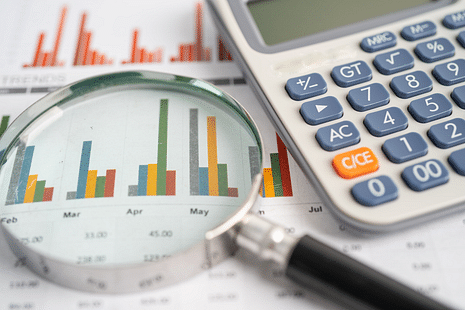
If you’re in Class 12 or have just completed your board exams and are planning to build a career in Economics, exploring areas like market trends, policies, and value systems, you might be hitting a common roadblock: Choosing between a BA Economics and a BSc Economics degree.
Both these courses seem to lead in the same direction, that is, an Economics degree. However, the focus, structure, skill development, and career outcomes can always differ between the courses. This article will break down the difference between BA Economics and BSc Economics to help you and many other students understand what both these courses are all about and then make an informed decision.
What is BA Economics?
A Bachelor of Arts (BA) in Economics is an undergraduate program that studies economics through social sciences and liberal arts . Its main emphasis is to make students understand economic theory, public policy, historical context, and political analysis . You will also study subjects like development economics, international relations, sociology, and political economy.
The main focus of this course is to build a strong theoretical and qualitative understanding of economic concepts. It will suit students who enjoy and want to pursue their career in the fields of writing, critical thinking , and at the same time, exploring the human and social aspects of economic decisions.
Career paths mostly include civil services (like UPSC ), public policy think tanks, NGOs, academic research, and teaching.
Check Best Career Options after BA Economics Degree
What is BSc Economics?
The Bachelor of Science (BSc) in Economics degree focuses mainly on mathematics, statistics, and quantitative methods and their applications . This course is structured for students who enjoy numbers, logical reasoning, and analytical problem-solving. The subjects included in the course are: econometrics, game theory, mathematical modeling, and statistical methods.
BSc Economics is a science stream in economics degree that prepares its students for roles that include a lot of data and numbers. The domains that you will be able to explore after the completion of this course are: finance, consulting, analytics, research , and international organizations . Students enrolling in this course also get the opportunity to learn Coding, data tools like R and Python, and advanced mathematics.
BA vs BSc Economics: Key Differences
There are some major differences between BA Economics and BSc Economics, which you must understand. Knowing these differences will help you to make a very informed decision.
Feature | BSc Economics | BA Economics |
|---|---|---|
Stream | Science | Arts |
Common Subjects | Econometrics, Calculus, Game Theory | History, Sociology, Political Science |
Skill development | Logical Reasoning, Data Analytics | Critical thinking, writing |
Career scope | Consulting, Analysis, Finance | Civil Services, Teaching |
Focus Area | Maths, Statistics, Modeling | Theory, qualitative, Policy |
Eligibility | 12th Standard (Maths is required) | 12th Standard (Arts/Commerce) |
Which Degree Should You Choose?
Based on the following points, you can choose which degree is best for you:
Choose BA Economics if:
- You are interested in subjects like History, and you want to learn political science or Sociology
- You are determined to pursue your career in the fields of Civil services, government jobs, public policy maker, or research
Choose BSc Economics if:
- You enjoy mathematics and you are more leaned towards Statistics and analytical thinking.
- You want to pursue your career in the fields of finance, consulting, banking, and more data-driven roles.
- You are also planning to pursue an MSc degree or want to work in a global financial firm.
Eligibility & Admission Process
The eligibility criteria for both courses vary. The following differentiations will help you understand:
BA Economics :
- Open to students pursuing the Arts or Commerce stream
- Maths is optional in many universities.
- Universities like Delhi University require entrance exams such as CUET .
- Typically, for students who belong to the Science stream with Mathematics is one compulsory subject.
- Select universities may require entrance exams like the Ashoka Aptitude Test , ISI Admission Test , or IIT-HSEE .
Career Scope & Higher Studies
Both degrees open up strong career scope pathways for you in the future, though the nature of roles varies in many ways:
- Civil services , teaching , academic research, or policy analysis .
- NGOs, government departments, and media also hire BA grads.
- Finance , investment banking , consulting , data science , or international trade sectors.
- Higher education options mostly include MA, MSc, MBA, M.Phil., or Ph.D. in economics, public policy, business, or analytics.
Top Colleges Offering BA Economics and BSc Economics Courses
The table below mentions the top institutions in India offering BA Economics and BSc Economics degrees:
BSc Economics | BA Economics |
|---|---|
Indian Statistical Institutes | JNU |
Ashoka University | Delhi University |
Shiv Nadar University | Lady Shri Ram University |
IIT Kharagpur | Presidency University, Kolkata |
Deciding between a BA and a BSc in Economics isn’t always easy, but understanding your own interests and strengths can make the choice much clearer. If you're drawn to understanding how economics interacts with society, politics, or public policy, a BA might be the right fit. But if you're more inclined towards numbers, data, and analytical problem-solving, a BSc could open the door to more technical and finance-focused roles.
Are you feeling lost and unsure about what career path to take after completing 12th standard?
Say goodbye to confusion and hello to a bright future!

FAQs
BA Economics is better suited for UPSC as it covers social sciences, public policy, and current affairs, aligning closely with the civil services syllabus.
BA Economics grads typically earn ₹3–6 LPA in public policy, teaching, or civil services. BSc grads earn ₹5–10 LPA in finance, analytics, and private firms.
Switching from BA Economics to BSc Economics is difficult due to different course structures and subjects like advanced Maths in BSc. You may need to restart or take bridge courses if allowed.
It depends mostly on your interests: BA Economics is better for theory and governance roles, while BSc Economics is ideal and it's main focus is on analytical and finance-driven careers. Neither is universally better.
BSc graduates often start with higher salaries due to technical skills, averaging Rs5–10 LPA; BA grads earn Rs3–6 LPA depending on role, sector, and experience.
Both the courses offer good career options; BA suits civil services and policy roles, while BSc offers stronger opportunities in finance, consulting, and data analytics.
Yes, many universities allow Arts or Commerce students to pursue BA Economics without Mathematics as one of their main subjects in 12th, as the program emphasizes theory, policy, and qualitative analysis over numbers.
Yes, most universities require Mathematics as a compulsory subject in the 12th for BSc Economics due to the course’s quantitative and analytical subjects.

















Similar Articles
Important Topics for CUET Psychology 2026
CUET 2026 Application Form Correction Window: Dates (Out), Steps to Edit, Do's and Don'ts
CUET UG 2026 Login: Application Number, Password, Steps to Retrieve
Colleges Accepting CUET in Bangalore 2026: Check List of State, Deemed and Private Universities
Structure of CUET 2026: Check Pattern, Marking and Exam Scheme
List of IIT JAM Exams Centres Under IIT Madras